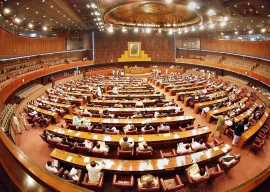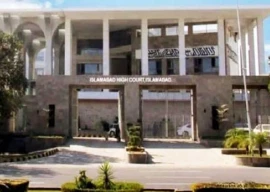
The Supreme Court on Thursday sought from the petroleum ministry and the Oil and Gas Regulatory Authority (Ogra) a detailed breakup of compressed natural gas (CNG), natural gas and liquefied petroleum gas (LPG) prices as well as copies of agreements between the government and petroleum companies.
A three-judge bench, headed by Chief Justice Iftikhar Muhammad Chaudhry, questioned the mechanism of how CNG prices are set and asked the petroleum ministry and Ogra to explain the link between the price hikes of CNG with petroleum products.
The court also asked them to submit details of the weekly price review of petroleum products, along with the component cost and the decisions of the Economic Coordination Committee (ECC) of the Cabinet to allow Ogra and the petroleum ministry to fix prices on a weekly basis.
Chief Justice Chaudhry asked Petroleum Secretary Dr Waqar Masood to explain why there was such a huge difference between CNG prices and its raw component, natural gas, especially since gas was being produced domestically.
Masood informed the apex court that 80% to 85% of petrol is imported, thus petrol prices were adjusted against the international market prices, and also adjusted gas prices against petrol prices. He added that prices of petroleum products in the country would fall, following the setting up and functioning of more refineries.
Justice Jawwad S Khawaja pointed out that while petrol is imported from abroad, gas is produced in Pakistan, which begged the question as to why gas prices are linked with petrol prices. Masood said this was because the LPG quota system was abolished in 2002 and the government had given subsidies worth Rs46 billion to domestic consumers.
“Why do consumers have to suffer because of the losses incurred by petroleum companies?” the chief justice asked.
Masood was then ordered to also explain where the money generated from the Petroleum Product Levy (PDL) was being used. Chief Justice Chaudhry was bewildered as to why the government could not levy the money generated by the PDL, following the lapse of the ordinance that imposed a carbon tax on petroleum companies.
Masood informed the apex court bench that CNG prices are determined as per the ECC’s guidelines. He also submitted the implementation report on the recommendations made in the Justice (retd) Rana Bhagwandas report.
Chief Justice Chaudhry said that the government was not entering into an agreement with petroleum companies on a daily basis for price adjustment, as the agreements were for a specific period. But CNG rates were still increasing daily.
The court also observed how the ECC could make major decisions, such as raising the prices of petrol and CNG, without consulting all the provinces, when autonomy was granted to the provinces under the 18th Amendment. It added that as a result, the provinces were suffering immensely. Justice Khawaja said that such decisions should be taken in the Council of Common Interests instead.
The court later adjourned the case till October 24.
Published in The Express Tribune, October 19th, 2012.
COMMENTS (1)
Comments are moderated and generally will be posted if they are on-topic and not abusive.
For more information, please see our Comments FAQ













































The judges should stay away from matters relating to economy, which is not their forte. Last time they messed with the price of sugar in Punjab it lead to embarrassment when the ecconomists tried to teach them the basics of economics. They stopped the privatization of steel mill and pakistan has lost billions since then. The judges should remember that they are just simple mediocre lawyers elevated to the positions of judges.